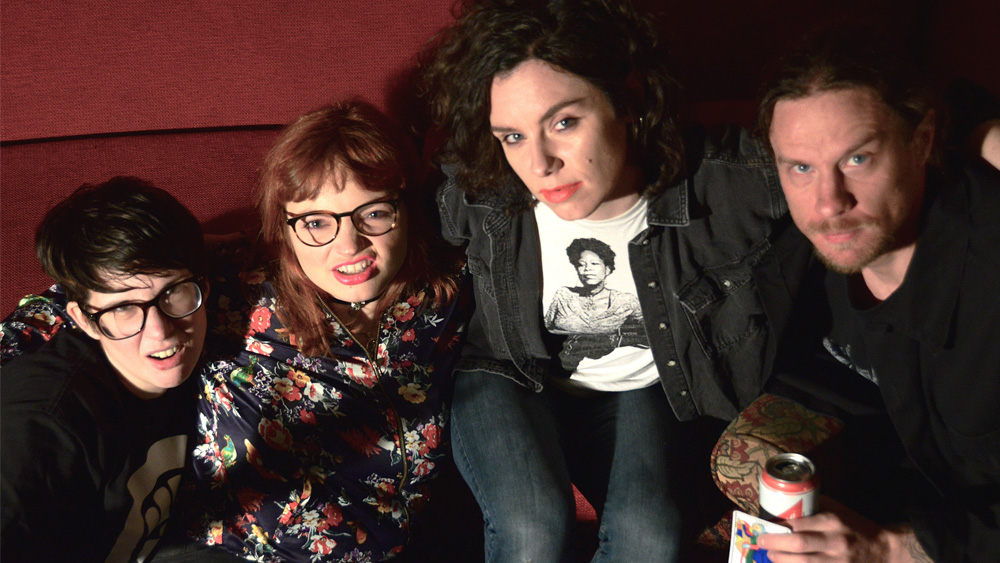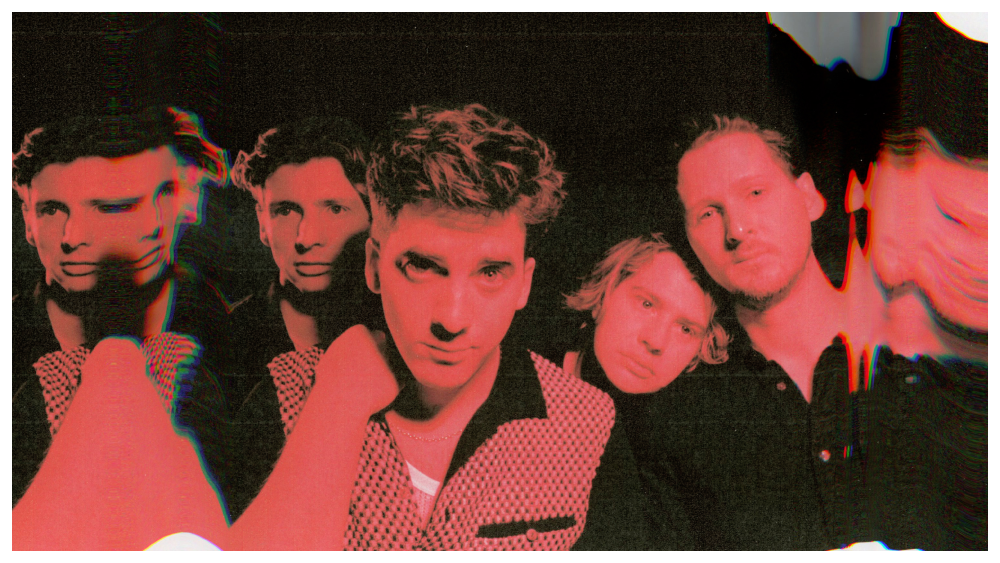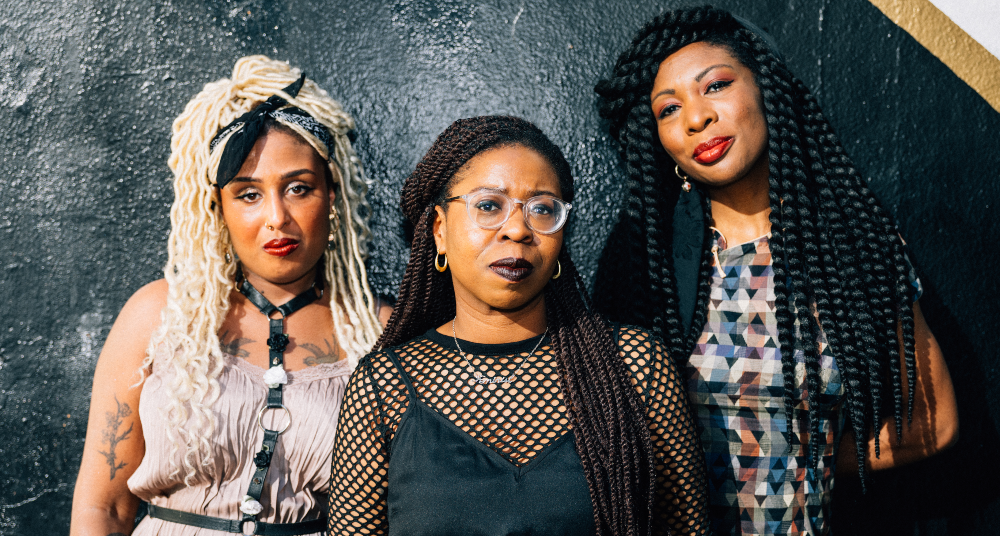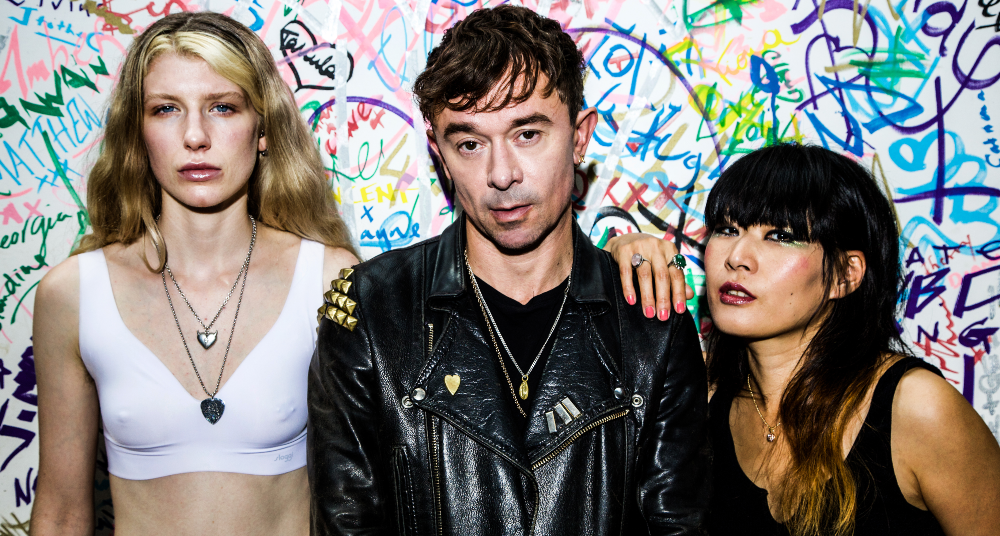Since their formation in 2012, the band has pursued an altogether more abrasive path than ‘happy love songs’ would allow.
From their debut single Breasts through their Housewives Trilogy EP, ILL have set out their stall as post-punk feminists who issue pithy takes on the evils of capitalism, misogyny, and the disintegration of national services like the NHS.
The band’s bite was no less sharp on their 2018 debut We Are Ill, which married their fiercely socio-political stance with the melodically shambolic character of Bananarama, and not to mention a generous splash of their infectiously inky humour.
Unafraid to oscillate between genres and mix pop sensibilities with heavy inclinations, ILL’s debut found them on national radio and playing some of the biggest gigs of their career.
2019 looks no less busy for the band, with a run of gigs lined up and a new member in tow.
Guitarist Ben Nield has recently joined the fold, replacing Sadie Noble – who played on the album – and Tamsin Middleton – who was the band’s live guitarist.
As Harri Shanahan (vocals / keys), Whitney Bluzma (vocals / bass), and Fiona Ledgard (drums) welcome their latest recruit we chat to the band about their highlights of last year, the power and politics of music, and the prospect of playing the Albert Hall…
Your debut record, We Are Ill, was released last year, how has it been since the album came out?
Whitney: It was a surprise really, for us. We never thought it would get the recognition that it did. [We were] pleasantly surprised, because when we were recording the album we liked it ourselves, our producer John Tatlock loved it, our friends, other than that, we weren’t really sure if people were going to understand us. It’s been a really nice surprise. Ben says he thinks it’s okay! [laughs]
Harri: Since then it’s been cool. We did a session on 6 Music, and that was really cool. I think it was through that we did a little bit of a tour with The Lovely Eggs, it was really fun. Then we had a bit of time trying to find a new guitarist, and that’s what we’ve been doing since we came off tour and we’ve now got a bunch of gigs lined up. We’re doing Cardiff Psych Fest, which we’re really excited about.
How would you describe your music to someone unfamiliar with the band?
Harri: I usually say it’s like Iggy Pop having a fight with Kylie Minogue in a bin. It’s very disco, it’s very noisy, it’s like a lot of worlds that don’t normally go together. We usually just rant enthusiastically and wave our arms about when we’re asked that question.
Whitney: Plus you could say psych, doom, disco, krautrock, a bit post-punk, and a bit of goth thrown in for good measure.
Harri: Oh no, not the goth! It even goes prog at times. We never set out to make a particular kind of music. I don’t want to say fusion, but it’s very eclectic.
What was the process of recording the album like?
Fiona: Very hot and sweaty. We recorded with John Tatlock, he bought his box mobile recording studio to our practice room. We’ve got a room in a big old mill in Ancoats – a bit of industrial revolution history which is close to our roots. John came over on a really hot sweaty day – two years ago, was it now? It was really nice because it meant we could all play the way we all normally play where we can all see each other and not get separated out into booths. He liked the room and it was a really friendly way to work. The mixing took a very long time because, obviously, the recordings weren’t as clean. But I think it really does capture the energy, so it was a really good way to work.
Whitney: We had two sessions; we had the three songs done in winter in a really small boxy, horrible practice room, and the rest of it was done in the really horrible heat in mid-July, in summer. It was both extremes. John was great to work with because he just let us come up with ideas, and wasn't kind of pushing an agenda. Really nice to work with. I don’t think we could have done it any other way.
Harri: It is important, I think. If you’ve got nothing to say there’s no point in saying it, is there? The things that we say are important because they matter to us and they matter in the world. It’s not like we set out to write protest songs, but we write about things that our close to our hearts, and there’s a lot of things going on in the world that are not exactly optimal [laughs]. It gets in your mind and it comes into your music. If you are just making a bunch of happy love songs in today’s climate then you’ve kind of missed what music’s for. Or maybe you’re just having a nice time, I don’t know.
Fiona: It’s also important, as music is one form of expression and it’s totally subjective. But if you need to make a statement and you can make it through music, then that’s beautiful, it’s cathartic, it’s therapeutic. And it’s therapeutic for other people that listen to it and come to your gigs, and sing the lyrics and speak to each other about what they feel. Community is being broken down more and more in society, and if people can feel a sense of community when they go to gigs [that's great]. In the live music scene when people connect with each other through live music, or making music, or buying music there’s something very, very powerful and political in that.
A dark sense of humour runs through the record, was that an essential part of getting the character of the band across?
Harri: It’s kind of how we deal with things, as people. You’ve gotta laugh or you’d stab someone [laughs]. I’m quite an angry person and I kind of mitigate that with a lot of humour, because otherwise I would just be an awful, awful person to be around all the time. And also, satire is a really powerful force; lampoon someone, that’s better than attacking them. You take back your power when you take the piss, sometimes.
Whitney: What Fiona said there about shared community, when you unleash your anger through humour that’s what makes other people connect to the lyrics. If it was all just anger, I don’t think it would be catching on the way it is. It’s because it’s a shared in-joke about how terrible things are that other people find relief in it as well.
Fiona: Yeah, in the current political climate humour seems more and more appealing and energising for everyone involved.
It’s a survival mechanism as much as anything else.
Harri: Absolutely.
What was your highlight of last year?
Fiona: Probably the 6 Music session with Mark Riley, which was fantastic. The Lovely Eggs tour was beyond belief – fun and exciting. We played a few gigs across Scotland – Glasgow was amazing! And also, we played the midlands as well.
Whitney: And the album launch at the Deaf Institute, which was the biggest show we’ve done in Manchester. That was great.
Fiona: Which leads us to our new guitarist Ben, who jumped in on the drums. He was invited, and joined me on the drums at the album launch gig on one of our songs – was it Drunk Fight? And also, Ben is playing guitar with us now and he's just completely joined in on the fun, turned up with notes, and really taken [the role] and run with it. We’re really happy with what he’s doing. So far so good.
You’re playing the Albert Hall in March as part of Unstoppable Voices, how does that feel?
Harri: It was really nice to have something to go tell my grandma. All my cousins have proper jobs and stuff, and I was like, ‘well I am playing the Albert Hall nan,’ and she said ‘really?’ It’s part of Unstoppable Voices, which brings people who might be less heard to a prestigious venue.
How did it come about?
[Lots of conferring]
Whitney: I think we just had an email from the programme manager of the Albert Hall asking us to play. I thought it was a crank email, that would [go on to] say ‘we need a £100 deposit for you to play,’ but it was legit. They just heard about us, and we got to pick our own support act – we still don’t know who’s been confirmed – but that was really nice of them as well. My mum said, ‘well you don’t need a manager’ and it’s like, yeah, you're right.
Harri: We’re gonna try and write some new material because we’d quite like to make a second album. We’ve got a few tracks that didn’t make the first album, so they need to go on. [It’ll be] a bit darker, a bit heavier, a bit psychier. We’re really keen to get some new material on the go.
Whitney: And hopefully to start things off, one of our favourite songs we’ve been playing live for the last year should be out as a single and video.
What makes the band work?
Fiona: Whitney, she makes us all work. [laughs]
Whitney: Mutual hard work and dedication – even when we’re sat here on a Friday night in a cold practice room with no heating.
Fiona: A sense of empathy and understanding, and non-judgmental vibes with each other. And snacks.
Whitney: Mostly hummus.
Harri: A lot of snacks to keep us going. But yeah, it’s really important.
Fiona: And friendship.
Harri: And friendship, yeah. We’re on the phone to each other all night long.
What’s the last great record you heard?
Fiona: Oh god, I’ve been thinking about this today. Come back to me.
Harri: The last great record that I heard? Oh, there’s two though. I got given the Dead Skeletons, Live in Berlin on vinyl for Christmas, and that was really cool. I think they only recorded one album, and then they did this live album. There’s so much energy and doomyness to it. I love how fun they are and how dark they are at the same time, it’s a really good mix. Then I listened to Nummo Twin, Deep Sleep. It’s just an independent, bedroom record. One of the most fantastic things I’ve ever heard and it’s on Bandcamp if anyone is interested.
Whitney: The one I can remember – I’m sure there’s been others since – Pigs Pigs Pigs Pigs Pigs Pigs Pigs, King of Cowards. My first listen was on my lunchbreak at work, and I remember feeling like I was ready to smash things up. It’s a great album, and even better live. We were really lucky to support Pigs at the Star & Garter, it was a really, really amazing gig.
Ben: I’ve got some albums – apart from the ILL album obviously – Mark Deutrom, The Bluebird it’s called, I’ve only heard it once, but it’s great. Last night I listened to Gnossiennes and Gymnopédies by Erik Satie, I listen to him quite a lot.
Fiona: Mine’s quite a throwback but I’ve been listening to The Legacy of Disco lately. It’s just got some amazing stuff on there from the seventies. It’s all B-sides and stuff that you wouldn’t necessarily have heard of. It brings me a lot of joy and I turn it up very loud at home and listen to it a lot. I love disco music. There’s some Sylvester on there, Jackson 5 stuff, but it’s not what you’d expect, not the shit that you heard in really bad mainstream club nights. [It’s] the good stuff like Idris Muhammad, a disco legend as well, but I’ll let you get back to the interview...
We Are Ill is out now.
Forthcoming 2019 tour dates
Feb 9 Hope and Anchor, London
Mar 2 Wharf Chambers, Leeds
Mar 16 After Dark, Reading
Mar 17 Royal Albert Hall, London
Apr 6 Soup Kitchen, Manchester
May 26 Cardiff Psych & Noise Fest, Cardiff
weareill.com
Photo by Mirko Lazzarin





